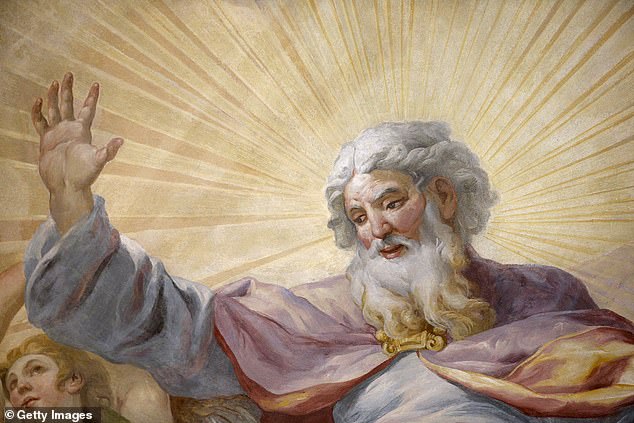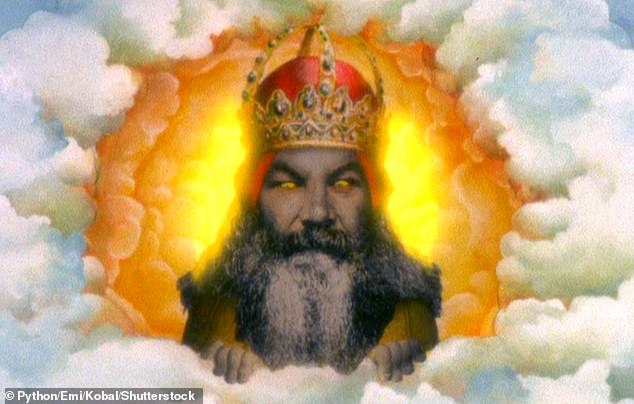It’s surely the biggest question of all – does God exist?
For centuries, the answer has been a huge subject of debate, argued over by priests, academics, and the public alike.
And it is surely intertwined with the matter of why humans are here on this planet – dating right back to the Big Bang 14 billion years ago, or even longer.
God – depicted in films and TV such as Monty Python, The Simpsons and Bruce Almighty – is of course not unique to Christianity.
But regardless of religion, dire events like wars, earthquakes and personal tragedies often make humans question the existence of an almighty deity.
No scientific evidence of God’s existence has been found – although many would argue the proof we are alive is proof of God.
So is there a God, and if so, what form does God take?
Now, researchers give their definitive answer to the eternal question.


In popular culture, God has long been portrayed as an older bearded man in white robes, notably in Italian artist Michelangelo’s ‘The Creation of Adam’.
Forming part of the Sistine Chapel’s ceiling in the Vatican, the 16th century work depicts the moment humanity was created through the hands of God.
Even in the Bible, God is referred to as ‘he’ and ‘him’, while a passage in the Old Testament even supports the traditional all-white depiction.
It reads: ‘His clothing was as white as snow; the hair of his head was white like wool. His throne was flaming with fire, and its wheels were all ablaze. river of fire was flowing, coming out from before him.’
Despite the use of pronouns to refer to God (both ‘he’ and ‘she’), God does not exist either as a man or as a woman, according to religious experts.
Instead, God exists in a subjective sense – as a guide and source of strength for millions of people – and not in a human form.
Dr Ilia Delio, theologian at Villanova University in Pennsylvania, says society has long attributed human characteristics to God – but that doesn’t make God human.
‘We have anthropomorphized God – making God into a super ‘man’, the big guy in the sky we can either accept or reject,’ she told MailOnline.


‘But this is not God – it is a projection of our need for a god.’
God is ‘not an object to behold’ but a ‘subject’, ‘the name of Being itself’ and ‘a symbol for unconditional life’, Dr Delio added.
‘Whoever argues for or against God has not understood the word God,’ she told MailOnline.
‘Hence, God is not an object to argue about but the ground of all that is, not beholden to the limits of the human mind.’
Alexandros Batalias, PhD candidate in AI and theological anthropology at Cambridge University, agrees that God is not an object, but ‘a subject’.
‘Throughout the history of Christianity, theologians and philosophers have sought to use rational arguments and evidence to demonstrate the existence of God,’ he told MailOnline.
‘But the reality of God is not provable because it transcends human understanding.
‘There is no way to construct an argument or theory that can objectively prove the existence of God, as God is not an object to be analyzed or measured.’


Whether or not God created the universe is a hotly contested matter – one which may not ever have a definitive answer.
Although, many scientists would admit there is not available evidence to disprove this theory, much like there’s not any experiment that could detect God.
Scientists generally agree that the universe sprang into existence when the Big Bang occurred around 14 billion years ago.
While some Christians think the Big Bang needed a divine creator to occur, many academics have refuted this suggestion, including the late Stephen Hawking.
The legendary English physicist said the Big Bang was inevitable due to the law of gravity, contesting Sir Isaac Newton’s belief that the universe must have been designed by God as it could not have been created out of chaos.
In his 2010 book ‘The Grand Design’, Hawking said ‘the universe can and will create itself from nothing’, sparking a religious debate.
‘It is not necessary to invoke God to light the blue touchpaper and set the universe going,’ he said, adding: ‘Spontaneous creation is the reason there is something rather than nothing.’
Meanwhile, British evolutionary biologist Richard Dawkins famously identified seven milestones that categorize the belief in the existence of a deity.

It ranges from 100 per cent sure there is a God (theist) to 100 per cent sure there is no God (atheist) – with 50 per cent sure (completely impartial) in the middle.
While some may argue the existence of a God may depend largely on personal belief and faith, Dawkins, an atheist, thinks the concept of personal god qualifies as a delusion.
In The God Delusion, he wrote: ‘There is something infantile in the presumption that somebody else has a responsibility to give your life meaning and point.
‘The truly adult view, by contrast, is that our life is as meaningful, as full and as wonderful as we choose to make it.’

